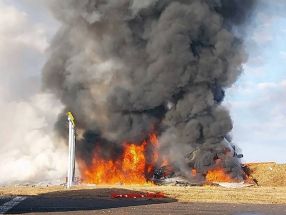UN approves measure to combat al-Qaeda fighters
UNITED NATIONS — Responding to the growing terrorist threat in Iraq and Syria, the UN Security Council imposed sanctions yesterday on six men for recruiting or financing foreign fighters, and threatened additional sanctions against those supporting terrorist groups.
The UN's most powerful body, in a resolution adopted unanimously, also demanded that the Islamic State extremist group and all al-Qaeda-linked groups end violence and disarm and disband immediately.
The British-drafted resolution follows the recent offensive by the Islamic State militant group, which has taken control of a large swath of eastern Syria and northern and western Iraq, brutalizing civilians and forcing hundreds of thousands to flee, as well as increasing terrorist activity by other al-Qaeda-linked groups including Jabhat al-Nusra in Syria.
The resolution "represents the international community's comprehensive rejection of these terrorist groups and expresses its determination to respond," British Ambassador Mark Lyall Grant told the council after the vote.
He said it sends a clear message that the international community "utterly condemns" the Islamic State group's "brutal and mindless terrorist acts, rejects its violent extremist ideology and is united in its resolve to oppose and confront it."
The six men now subject to a global travel ban and asset freeze include four who either recruited or helped finance al-Nusra — Abdelrahman Mouhamad Zafir al Dabidi al Jahani, Hajjaj Bin Fahd Al Ajmi, Said Arif and Abdul Mohsen Abdallah Ibrahim al Charekh.
Another man, Hamid Hamad Hamid al-Ali, was blacklisted for helping finance both al-Nusra and the Islamic State group, and another, Abou Mohamed al Adnani, for financing and perpetrating acts supporting the Islamic State group.
Al Jahani and Al Ajmi are already subject to US sanctions.
According to the US Treasury Department, al Jahani was participating in fighting in Syria and working with counterparts in Pakistan, where he previously operated, to acquire heavy weapons and trainers to support al-Qaeda efforts. The Treasury alleges that Al Ajmi agreed to provide financial support to al-Nusra in exchange for installing Kuwaitis in the group's leadership positions.
Al Adnani is the spokesman for the Islamic State who was seen on video proclaiming the establishment of a caliphate on captured territory in Syria and Iraq on June 29, according to UN diplomats. The chosen caliph, Abu Bakr al-Baghdadi, is an Iraqi militant with a $10 million US bounty on his head.
Arif, an ex-Algerian army officer, escaped house arrest in France last year and is reportedly a key recruiter of foreign fighters for al-Nusra in France and north Africa. Al Charekh, from Saudi Arabia, is allegedly a leader of al-Qaeda operations in Syria, and al-Ali, a Kuwaiti, allegedly purchased arms and equipment for al-Nusra and paid for travel for foreign fighters, according to UN diplomats.
US Ambassador Samantha Power said imposing sanctions on the six "demonstrates the council's urgency to take concrete action against those who supply the guns and those who use them."
"The numbers of foreign fighters in Syria and Iraq, as well as their source nations, are unprecedented," she said. "Reportedly as many as 12,000 participated in the conflicts. And the return of radicalized battle-hardened jihadists to their home countries or other vulnerable destinations has the potential to widen the scope of the violence."
"This is the new front of the terrorist threat, and one with a devastating human cost," Power said.
The resolution was adopted under Chapter 7 of the UN Charter, meaning it can be militarily enforced. But Russia's deputy UN ambassador, Petr Iliichev, stressed that "this cannot be seen as approval of the use of military actions."
The Security Council adopted a wide-ranging resolution immediately after the Sept. 11, 2001 terrorist attacks in the United States to tackle terrorism. It demanded that all 193 UN member states adopt national laws to combat terrorism.
The council also extended sanctions against the Taliban in Afghanistan, which were imposed in 1999, to cover al-Qaeda and later its far-flung affiliates.
The resolution adopted yesterday urges all countries to meet their obligations under the 2001 resolution.
It notes "with concern" that oil fields controlled by the Islamic State group, Jabhat al-Nusra and other al-Qaeda-linked groups are generating income that is supporting their recruitment efforts and ability to carry out terrorist operations.
The resolution calls on all countries to take measures to suppress the flow of their citizens and residents to fight for terrorist groups and bring those who do to justice.
It also encourages governments to engage with communities and individuals who are "at risk of recruitment and violent radicalization to discourage travel to Syria and Iraq" to fight with terrorist groups.
- Latest
- Trending































